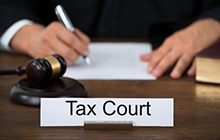MNR v Zhao: CRA collection action when there are reasonable grounds for delay

Canadian accountant and tax lawyer David J Rotfleisch on the Canada Revenue Agency’s successful jeopardy order in a high-profile BC real estate case
Editor’s note: For readers intrigued by the evolution of this story, background on this high-profile case was reported by the CBC (August, 17, 2022) in Tax agency obtains 'jeopardy order' for debt from Downton Abbey-loving billionaire, in which Mingfei Zhao’s “lifestyle does not match reported income.”
In 2016, the CBC covered the renovation of the historic property known as The Richmond, located in the Shaughnessy neighbourhood of Vancouver; the Globe and Mail in 2020; and the Georgia Straight in 2020. The property was also the subject of a lawsuit involving renovations reported by Business in Vancouver. Zhao was represented by KPMG Canada and KPMG LLP.
Introduction: CRA files an ex parte application to take collection action
In Canada (National Revenue) v. Zhao, 2022 FC 1108, the Canada Revenue Agency (CRA) filed an ex parte application for a jeopardy order authorizing CRA to take collection action with respect to amounts of income tax owing that were assessed against a taxpayer.
Mr. Zhao, a businessman who was born in China, immigrated to Canada in September 2014. In 2018, the CRA launched a net worth audit of him and reassessed his personal income on the basis that he failed to report his foreign income for the 2014 and 2015 taxation years. The taxpayer then left Canada in 2022 and there was no proof that he would return to Canada. As of June 20, 2022, the total amount of tax plus interest and penalties owed by the taxpayer was $770,710.19.
The Court granted the CRA the jeopardy collection application on the basis that there were indeed reasonable grounds to believe taxpayer may transfer the proceeds of sale from the property in order to make them unavailable to the CRA. In addition, the Court also found that the taxpayer had not conducted his affairs in an orthodox fashion, which would it make it difficult for the CRA to trace or recover the tax debt.
Potential Jeopardy Concerns
The CRA argued that there were several reasons that the collection would be jeopardized for delay:
- The reassessment was due to the taxpayer's failure to report his worldwide income and indicated a range of income out of scale with the incomes disclosed on his tax returns,
- The taxpayer's lifestyle did not match his reported income;
- The taxpayer had no known active business and
- There were indications that the only exigible asset held by the taxpayer was in jeopardy.
The CRA also conducted several searches against the taxpayer and found only his real property located in BC and a Range Rover. Apart from these two assets, the CRA was not aware of any other assets held by the taxpayer or any other source of income. Furthermore, Mr. Zhao left Canada around April 2022 and his accountant told the CRA that he would not provide any security for the tax debt.
The Court found there were reasonable grounds for the CRA's application
Under section 225.1 of the Income Tax Act, if a taxpayer is liable for the payment of an amount assessed under the Income Tax Act, the CRA should not take any of the collection actions listed under s.225.1(1.1) before the day that is 90 days after the mailing of the notice of assessments with certain exceptions. If the taxpayer files a notice of objection or an appeal of the assessment, then the CRA may not take any of those collection actions until the objection, or the appal, has been finally determined.
However, s.225.2(2) provides that, where on an ex parte application by the CRA, a judge is satisfied that there are reasonable grounds to believe that the collection of all or any part of an amount assessed in respect of a taxpayer would be jeopardized by a delay in the collection of that amount, the judge shall, on such terms as the judge considers reasonable in the circumstances, authorize the CRA to take forthwith any of the collection actions described in s.225(1.1) with respect to the amount.
The Court found that the evidence supported the CRA's concern that the collection would be jeopardized by the delay. The taxpayer was already in the process of liquidating his only significant exigible asset in Canada and his assets did not reflect his income on the level he declared from 2014 to 2015. In addition, there was compelling evidence as to the dissipation of the taxpayer's assets out of the jurisdiction out of the CRA's reach. Furthermore, the taxpayer never intended to provide any security even though he no longer resided in Canada.
A notice of objection or appeal will stop the CRA's collection action subject to certain exceptions
In this case, the court sided with the CRA because the taxpayer already left Canada and there was risk to him to transfer the proceeds of sales from his only real property in Canada. Still, the CRA's collection activities may be halted if a taxpayer chooses to provide securities for his tax debt.
Although the CRA was able to enforce its collection action in this case, generally speaking a notice of objection or appeal will stop the CRA from taking its collection action until the objection or appeal has been determined under the context of Income Tax Act, unless the amount owing is placed in jeopardy if the restriction period is adhered to.
Editor’s Note: According to the Federal Court decision by the Honourable Madam Justice Strickland, Mr. Zhao’s legal representative “filed two Notices of Objection for the 2014 and 2015 tax years on behalf of Mr. Zhao. On May 8, 2019, the CRA Appeals Division sent a letter to Mr. Zhao confirming the receipt of the Notices of Objection. The Notices of Objection filed by Mr. Zhao were still in process as of the date of execution of the Gonwick Affidavit (June 29, 2022).”
David J Rotfleisch, CPA, JD is the founding tax lawyer of Taxpage.com and Rotfleisch & Samulovitch P.C., a Toronto-based boutique tax law corporate law firm and is a Certified Specialist in Taxation Law who has completed the CICA in-depth tax planning course. He appears regularly in print, radio and TV and blogs extensively.
With over 30 years of experience as both a lawyer and chartered professional accountant, he has helped start-up businesses, cryptocurrency traders, resident and non-resident business owners and corporations with their tax planning, with will and estate planning, voluntary disclosures and tax dispute resolution including tax audit representation and tax litigation. Visit www.Taxpage.com and email David at david@taxpage.com. Read the original article on Taxpage. Photo David Rotfleisch courtesy Rotfleisch & Samulovitch P.C.











(0) Comments